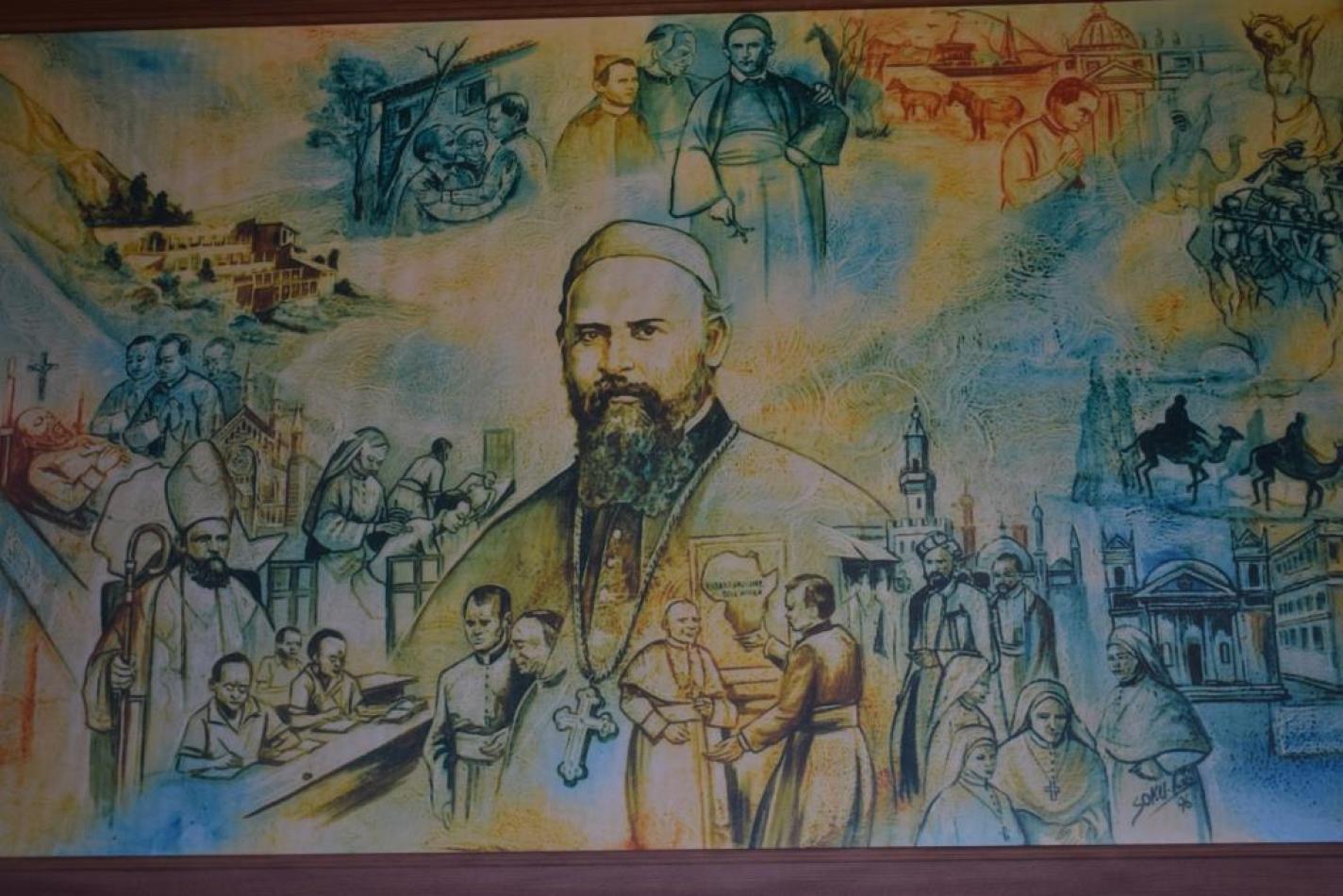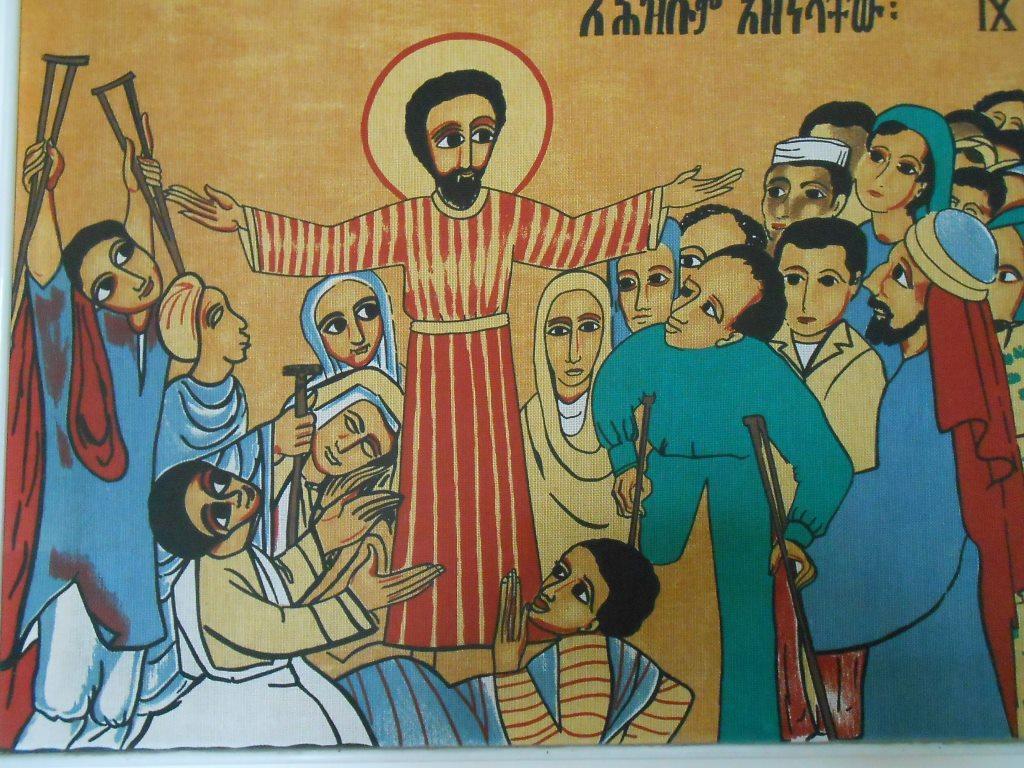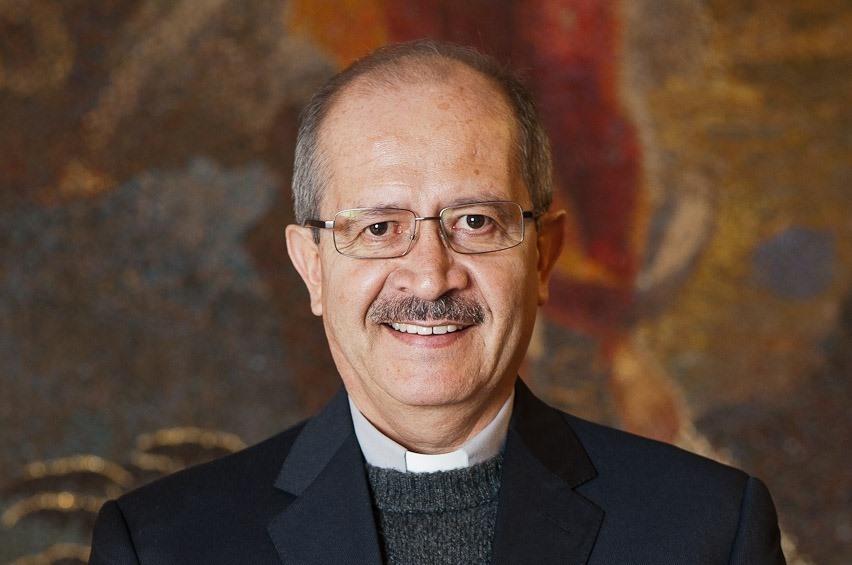Daniel Comboni
Comboni Missionaries
Institutional area
Other links
Newsletter
Called freely by the Father, inflamed by the love of Christ the Good Shepherd, consecrated by his Spirit and following the example of Daniel Comboni, we are sent into the world to witness to and proclaim the Good News of the Kingdom (CA ’03, 31).
Towards Mission with a faith renewed
Jesus speaks clearly to his disciples: “Remain united to me, and I will remain united to you. A branch cannot bear fruit by itself; it can do so only if it remains in the vine (…) Without me you can do nothing. As the Father sent me, so I send you” (Jn. 15:4; 20:21).
Mission means to set off, to study strategies, to renew one’s methodologies and programmes of apostolate. But, above all, Mission is to believe. It is carried on by acts of faith. If one does not live by faith, he cannot totally become part of a missionary project, or he may see Mission slip through his fingers. Now, in whom or in what do we have to believe?
To believe in God who chooses his apostles: “You did not choose me; I chose you and appointed you to go and bear much fruit, the kind of fruit that endures”, says the Lord (Jn. 15:16).
To believe in our vocation: God has granted us the privilege of a missionary vocation. We have, then, to believe in a God who believes in us, who, with divine humility, has made evident that he needs us to carry on his work in the world.
To believe in the Mission: to believe in the service required from us, in the task entrusted to us. Mission is a service of love and total self-oblation: “The greatest love a person can have for his friends is to give his life for them,” says the Lord (Jn. 15:13).
For Comboni, too, Mission requires total self-oblation, ad vitam: “The happiest day of my life will be the day when I offer up my life for you” (W 3159).
Towards Mission as servants
We all set off for the Mission with a lot of luggage. But what do we need to carry in our luggage? Jesus takes the trouble to describe his disciple’s luggage: “Take nothing with you for the journey: no stick, no travelling bag, no food, no money, not even a change of clothes. When you are welcomed to a home, stay there until you leave that town” (Lk. 9:3-4).
It is clear that the missionary’s luggage does not consist in things or resources, though useful and necessary, but rather in virtues. One of these, undoubtedly, is that of having the servant’s attitude.
In the Gospel, Jesus explains the virtue of the evangelising servant (see Lk. 9). The servant has to be:
Available. A servant is at his Lord’s attendance at all times. He is a full time servant, even when the situation makes him hang on, unable to do anything. The servant who is available is the one who is attentive and always ready to change or modify his own plans according to the circumstances or according to his Lord’s will.
Human. Jesus has a profound attitude of caring for the individuals. He favours the personal encounter, without letting himself be tempted by the achievements over large crowds. He reaches the heart of a person through care, sensitivity and, especially, compassion. He asks nothing in exchange and does not even request that his beneficiaries become his disciples. Jesus is attentive to the individual, gives him the time he needs, listens to him, encourages and loves him.
Prayerful. Mission is not always easy, therefore it has to be based on a solid spirituality: “Without me you can do nothing. Remain in me. If the Lord does not build the house, in vain do the builders work,” says the Lord. Mission is carried on through much prayer. Thus the Lord has taught us when he privileged the time he spent talking to his Father concerning his Mission.
Thus Comboni also teaches: “As I consider the work that I am doing entirely as God’s work, so every small and large undertaking concerning the Mission has to be seen in relationship with God: so that it is very important that the missionaries greatly privilege piety and the spirit of prayer” (W 3615). “Hands joined in prayer” are not busy working, grabbing something, but are resting in God… They are doing a Mission that bears fruit in abundance.
Prophetic. A prophet is one who looks for people in the places where they live and walks with them. He identifies himself with every situation of God’s people and becomes one of them. A prophet, above all, is a man of hope: restores hope, sows hope along the journey of God’s people. A prophet accompanies God’s people who walk “through the dark valleys of life,” in the certainty that God leads them to new horizons and new pastures.
Wise. A servant looks for his master’s wisdom, God’s wisdom. It is the kind of wisdom that helps him stand firm and trustfully in his difficult moments. A wise servant, moreover, is concerned to put God in the forefront, because the Mission is God’s.
A friend. “I don’t call you servants anymore, but friends,” says the Lord to his disciples, considering them as companions of Mission. To them he offers the gift of friendship, as they will have to work as friends. Friends work for love, without being worried about gains or schedules and, in particular, they identify themselves with the concern of the friend who has come for help. The friend-servant works and acts believing in and loving his Mission, God’s Mission.
There is a special blessing for a servant: “Wonderful! You are a good and faithful servant. I left you in charge of only a little, but now I will put you in charge of much more. Come and share in your master’s happiness” (Mt. 25:21).
It is the Lord’s gladness that gives value to the disciple’s apostolic life in every age (see CA ’03, 35).
Epiphany 2005
Fr. Teresino Serra, mccj
Superior General
Jesus speaks clearly to his disciples: “Remain united to me, and I will remain united to you. A branch cannot bear fruit by itself; it can do so only if it remains in the vine (…) Without me you can do nothing. As the Father sent me, so I send you” (Jn. 15:4; 20:21).
Mission means to set off, to study strategies, to renew one’s methodologies and programmes of apostolate. But, above all, Mission is to believe. It is carried on by acts of faith. If one does not live by faith, he cannot totally become part of a missionary project, or he may see Mission slip through his fingers. Now, in whom or in what do we have to believe?
To believe in God who chooses his apostles: “You did not choose me; I chose you and appointed you to go and bear much fruit, the kind of fruit that endures”, says the Lord (Jn. 15:16).
To believe in our vocation: God has granted us the privilege of a missionary vocation. We have, then, to believe in a God who believes in us, who, with divine humility, has made evident that he needs us to carry on his work in the world.
To believe in the Mission: to believe in the service required from us, in the task entrusted to us. Mission is a service of love and total self-oblation: “The greatest love a person can have for his friends is to give his life for them,” says the Lord (Jn. 15:13).
For Comboni, too, Mission requires total self-oblation, ad vitam: “The happiest day of my life will be the day when I offer up my life for you” (W 3159).
Towards Mission as servants
We all set off for the Mission with a lot of luggage. But what do we need to carry in our luggage? Jesus takes the trouble to describe his disciple’s luggage: “Take nothing with you for the journey: no stick, no travelling bag, no food, no money, not even a change of clothes. When you are welcomed to a home, stay there until you leave that town” (Lk. 9:3-4).
It is clear that the missionary’s luggage does not consist in things or resources, though useful and necessary, but rather in virtues. One of these, undoubtedly, is that of having the servant’s attitude.
In the Gospel, Jesus explains the virtue of the evangelising servant (see Lk. 9). The servant has to be:
Available. A servant is at his Lord’s attendance at all times. He is a full time servant, even when the situation makes him hang on, unable to do anything. The servant who is available is the one who is attentive and always ready to change or modify his own plans according to the circumstances or according to his Lord’s will.
Human. Jesus has a profound attitude of caring for the individuals. He favours the personal encounter, without letting himself be tempted by the achievements over large crowds. He reaches the heart of a person through care, sensitivity and, especially, compassion. He asks nothing in exchange and does not even request that his beneficiaries become his disciples. Jesus is attentive to the individual, gives him the time he needs, listens to him, encourages and loves him.
Prayerful. Mission is not always easy, therefore it has to be based on a solid spirituality: “Without me you can do nothing. Remain in me. If the Lord does not build the house, in vain do the builders work,” says the Lord. Mission is carried on through much prayer. Thus the Lord has taught us when he privileged the time he spent talking to his Father concerning his Mission.
Thus Comboni also teaches: “As I consider the work that I am doing entirely as God’s work, so every small and large undertaking concerning the Mission has to be seen in relationship with God: so that it is very important that the missionaries greatly privilege piety and the spirit of prayer” (W 3615). “Hands joined in prayer” are not busy working, grabbing something, but are resting in God… They are doing a Mission that bears fruit in abundance.
Prophetic. A prophet is one who looks for people in the places where they live and walks with them. He identifies himself with every situation of God’s people and becomes one of them. A prophet, above all, is a man of hope: restores hope, sows hope along the journey of God’s people. A prophet accompanies God’s people who walk “through the dark valleys of life,” in the certainty that God leads them to new horizons and new pastures.
Wise. A servant looks for his master’s wisdom, God’s wisdom. It is the kind of wisdom that helps him stand firm and trustfully in his difficult moments. A wise servant, moreover, is concerned to put God in the forefront, because the Mission is God’s.
A friend. “I don’t call you servants anymore, but friends,” says the Lord to his disciples, considering them as companions of Mission. To them he offers the gift of friendship, as they will have to work as friends. Friends work for love, without being worried about gains or schedules and, in particular, they identify themselves with the concern of the friend who has come for help. The friend-servant works and acts believing in and loving his Mission, God’s Mission.
There is a special blessing for a servant: “Wonderful! You are a good and faithful servant. I left you in charge of only a little, but now I will put you in charge of much more. Come and share in your master’s happiness” (Mt. 25:21).
It is the Lord’s gladness that gives value to the disciple’s apostolic life in every age (see CA ’03, 35).
Epiphany 2005
Fr. Teresino Serra, mccj
Superior General




